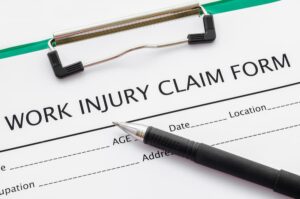Denied Workers’ Compensation Claim in California
Denied Workers’ Compensation Claim in California
You suffered a work-related injury or illness in California, and you applied for workers’ compensation to get the medical care and financial compensation you need. You were then disappointed and discouraged when you received a denial letter in the mail.
Do not despair. Insurance companies frequently deny many workers’ compensation claims. An experienced workers’ compensation attorney in California can review your case, explain the reasons for the denial, and work to get the workers’ compensation benefits you deserve.
Common Reasons Insurance Companies Deny Workers’ Comp Claims
 If the insurance company denies your claim, they will send you a denial letter. Carefully review the denial letter to understand why your employer or the insurance company denied your claim.
If the insurance company denies your claim, they will send you a denial letter. Carefully review the denial letter to understand why your employer or the insurance company denied your claim.
Some common reasons include:
- Failing to report your illness or injury promptly. You must report your job-related injury or illness within 30 days of learning about an injury or illness. If you wait too long, the insurer may deny your claim.
- Not filing properly. You must complete the workers’ compensation claim form fully and include all relevant facts, details, and reports pertaining to your job-related injury or illness. You must communicate accurate and clear information to your employer or the insurance company. Failing to complete the form in full or making mistakes can derail your chances of getting workers’ comp benefits.
- Failing to file a workers’ compensation claim in time. California law requires you to file a workers’ compensation claim within one year of your injury or becoming aware of your job-related illness. Certain factors can extend the deadline, and an attorney can determine if any exceptions apply to your case. You may also receive an extension if your employer misled you on how to file for workers’ comp.
- Medical treatment and reporting conflicts. If you didn’t get the proper medical treatment following your injury, or if the illness or injury to report on the form does not match your doctor’s medical report, you could receive a denial of your claim.
- Injury or illness is a pre-existing condition. You cannot file workers’ compensation for a condition that a work-related incident did not cause. Insurers will deny claims for pre-existing conditions, and they may deny claims that a current workplace incident exacerbated or aggravated a pre-existing condition.
- Injury or illness cause undetermined. If insurers cannot verify the cause of your injury or illness as work-related, they may deny your claim.
- Fraud. If your employer or the insurance company believes you are trying to claim workers’ comp fraudulently, they can deny your claim. Suspicions of fraud could arise if you provided conflicting or inconsistent information in your claim, or if someone observes you engaging in physical activity that suggests you are not injured.
- Filing after termination. If you tried to apply for workers’ comp after your employer fired you, the insurer may contend your injury did not occur at your former place of employment. However, if your employer fired you for filing a workers’ compensation claim, you have legal options for holding them accountable.
- Refusing to take or failing a drug or alcohol test. The workers’ comp program in California is a no-fault system—meaning you can get benefits even if you caused your own injury. However, this does not apply to injuries or illnesses resulting from drug or alcohol impairment on the job, nor does it apply to an employee’s willful negligence or recklessness. If you refuse to take a drug or alcohol test or fail them—or if evidence suggests your own recklessness caused your injury–the insurer may deny your claim.
- Refusing to provide a recorded statement. Sometimes, insurers will ask you to provide a recorded statement detailing the accident or incident that led to your work-related injury or illness. However, the insurer can also use what you say against you and deny your claim. You should never agree to provide a recorded statement to your employer or the insurance company without first an attorney’s advice.
In some cases, the insurer may deny your claim if they cannot corroborate that your injury or illness was work-related. Sometimes, they will seek eyewitness testimony from co-workers who may have seen the incident. However, the insurer should not deny your claim based solely on this reason, and if they do, consult an attorney immediately.
Challenging a Denied Workers’ Compensation Claim
If you receive a denial of your workers’ compensation claim, you can challenge the decision and get the benefits you need. As stated, you must carefully review your denial letter to understand the reason for your claim denial. This may help you identify any errors or misunderstandings that you can correct or clarify.
Consult with an attorney who focuses on workers’ compensation law. They can explain your rights, handle the appeal, and advocate for your interests.
Act quickly if you receive a denial of your workers’ compensation claim. You may face strict deadlines for filing appeals or pursuing other options. Working with an experienced attorney can help ensure that you understand your options, and a lawyer can fight for you and increase your chances of receiving the benefits you deserve.
Provide Additional Evidence
If the insurance company denied your claim due to a lack of evidence or documentation, you may submit additional information to support your case, which can include:
- You were injured or became ill: You will need to provide medical documentation that confirms that you suffered an injury or illness. This can include medical records, X-rays, MRI results, and other diagnostic tests.
- Your injury or illness is work-related: You will need to show that your work activities caused your injury or illness. This can include witness statements, incident reports, and other documentation that shows the connection between your injury or illness and your work.
- You were an employee at the time of the injury: You will need to provide documentation that confirms your employment status at the time of the injury. This can include pay stubs, W-2 forms, and other employment records.
- You reported the injury in a timely manner: You will need to show that you promptly reported your injury or illness to your employer. To do this you can provide incident reports, emails, or other documentation that confirms that you reported your injury or illness as soon as possible.
- You cannot work: You will need to provide documentation that shows that you cannot work due to your injury or illness. This can include medical reports, doctor’s notes, and other documentation that confirms that you cannot perform your job duties.
Every case is unique, and the evidence you will need to provide will depend on the specific circumstances of your case. An experienced workers’ compensation attorney can collect the evidence you will need to provide and give you have the best possible chance of receiving the benefits you deserve.
Appealing a Denied Workers’ Compensation Claim in California
After reviewing the denial letter and working with a workers’ compensation attorney to determine your rights and options, you may file an appeal. This typically involves submitting a written request for a hearing before an administrative law judge who will review the evidence and make a decision.
During the process, you may need to provide additional evidence to support your claim if the insurance company cited a lack of supporting documentation as a reason for the denial. Your attorney can gather medical records, witness statements, or other documentation that shows the connection between your injury and your work.
To file an appeal, your lawyer will submit an Application for Adjudication of Claim in the Division of Workers’ Compensation (DWC) office in the county where you live or in the country where you sustained your workplace injury. The DWC office will assign your case a number, which you will need to use on all documents regarding your claim going forward. Your lawyer may need to serve notice of your application to all parties involved, including your claims administrator.
To request a hearing of your claim denial, you must submit a Declaration of Readiness to Proceed form, and the DWC office will schedule a mandatory settlement conference (MSC) with a judge. The judge will work with you and your legal counsel, the claims administrator, and any other parties involved to reach a settlement. If you cannot settle your dispute at the hearing, the judge will schedule a trial date.
Another judge will oversee the trial, and attendance is mandatory. For the trial, you will need an attorney who can prepare your case as solidly as possible and include all pertinent information, documentation, and evidence. Your lawyer can outline the dispute and identify the items you will present at trial, including any witness testimony you plan to present. Your workers’ compensation attorney can also get a list of what the other party plans to present and their witness statements.
Your workers’ compensation claims appeals trial will work similarly to any other trial, where your attorney will present evidence to sway the judge’s decision in your favor. The other side will try to refute your claim. After hearing all the arguments and considering the evidence, the judge will render a verdict. They should send you a written decision in the mail. If the judge does not side with you and upholds the denial, you can file a Petition for Reconsideration and appeal the matter to a higher authority.
Consider Alternative Options
If the workers’ compensation system won’t provide the benefits you need, your lawyer may explore alternative options with you, such as:
- Social Security Disability Insurance (SSDI): If your injury or illness prevents you from working for an extended time, you may qualify for financial support from the Social Security Administration while you cannot work.
- Personal injury lawsuit: If the negligence of a third party (such as a manufacturer or contractor) caused your injury, you may file a personal injury lawsuit to seek compensation for your damages. This can include medical expenses, lost income, and pain and suffering.
- State disability benefits: Some states offer disability benefits in addition to workers’ compensation if you cannot work due to a non-work-related injury or illness.
- Short-term or long-term disability insurance: If you have short-term or long-term disability insurance through your employer or a private insurer, you may receive benefits if you cannot work due to an injury or illness.
Each of these options has different eligibility requirements and limitations, and they do not cover every state or circumstance. Each option comes with different costs, benefits, and potential impacts on your workers’ compensation claim. An experienced attorney can explain your options so you can make informed decisions about how to proceed.
Contact an Experienced California Workers’ Compensation Attorney for Help

Greg Bentley & Keith More Personal Injury Lawyers
You do not want to tackle or appeal a denied claim on your own. An attorney has the knowledge and skills required to submit as strong a claim as possible, and they can advocate for you throughout the process to improve your odds of success. Reach out to a personal injury lawyer.
The experienced California workers’ compensation attorneys at Bentley & More have helped thousands of clients throughout Newport Beach and across Orange County and beyond with their denied workers’ compensation claims. We are here to help you get the workers’ comp benefits you deserve as efficiently as possible so you can focus on your physical recovery. Contact us today for a free consultation.


